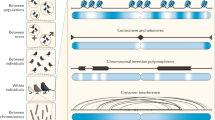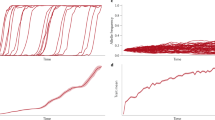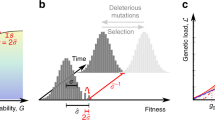Abstract
Since the genes in any given organism have evolved together to produce an adaptive phenotype, one might expect that rearrangement by chromosomal recombination would be maladaptive and thus wiped out by natural selection. This article reviews various theories that explain why, on the contrary, recombination is almost universal.
This is a preview of subscription content, access via your institution
Access options
Subscribe to this journal
Receive 51 print issues and online access
$199.00 per year
only $3.90 per issue
Buy this article
- Purchase on Springer Link
- Instant access to full article PDF
Prices may be subject to local taxes which are calculated during checkout
Similar content being viewed by others
References
Turner, J. R. Evolution 21, 645 (1967).
Maynard Smith, J. J. theor. Biol. 30, 319 (1971).
Fisher, R. A. The Genetical Theory of Natural Selection (Oxford University Press, Oxford, 1930).
Kimura, M. Evolution 10, 278 (1956).
Lewontin, R. C. The Genetic Basis of Evolutionary Change (Columbia University Press, New York, 1974).
Charlesworth, B. & Charlesworth, D. Genet. Res. 25, 267 (1976).
Abdullah, N. F. & Charlesworth, B. Genetics 76, 447 (1974).
Allard, R. W. Genetics 48, 1389 (1963).
Catcheside, D. G. Austr. J. biol. Sci. 28, 213 (1975).
Chinnici, J. P. Genetics 69, 71 (1971).
Dewess, A. A. Genetics 64, 516 (1970).
Detlefson, J. A. & Roberts, E. J. expl. Zool. 32, 333 (1921).
Kidwell, M. G. Genetics 70, 419 (1972).
Shaw, D. D. Chromosoma 37, 297 (1972).
Charlesworth, B. Genetics 83, 181 (1976).
Slatkin, M. Genetics 81, 787 (1975).
Williams, G. C. & Mitton, J. B. J. theor. Biol. 39, 545 (1973).
Williams, G. C. Sex and Evolution (Princeton University Press, Princeton, 1975).
Maynard Smith, J. J. theor. Biol. (1976).
Leigh, E. G. Amer. Natur. 104, 301 (1970).
Cox, E. C. & Gibson, T. C. Genetics 77, 169 (1974).
Strobeck, C., Maynard Smith, J. & Charlesworth, B. Genetics 82, 547 (1976).
Felsenstein, J. Genetics 78, 737 (1974).
Hill, W. G. & Robertson, A. Genet. Res. 8, 269 (1966).
Felenstein, J. & Yokoyama, S. Genetics 83, 845 (1976).
Author information
Authors and Affiliations
Rights and permissions
About this article
Cite this article
Smith, J. Why the genome does not congeal. Nature 268, 693–696 (1977). https://doi.org/10.1038/268693a0
Issue Date:
DOI: https://doi.org/10.1038/268693a0
This article is cited by
-
The effect of supernumerary segments on recombination in Euchorthippus pulvinatus (grasshopper): a comparative study between sexes and populations
Heredity (1993)
-
Inbreeding, self-fertilization, lethal genes and genomic coalescence
Heredity (1992)
-
Aging and chiasma frequency in Eyprepocnemis plorans (Orthoptera: Acrididae)
Genetica (1987)
-
Genetic analysis of ecological relevant morphological variability in Plantago lanceolata L.
Theoretical and Applied Genetics (1987)
-
The relationship between chiasma frequency and bivalent length: Effects of genotype and supernumerary chromosomes
Heredity (1986)
Comments
By submitting a comment you agree to abide by our Terms and Community Guidelines. If you find something abusive or that does not comply with our terms or guidelines please flag it as inappropriate.



